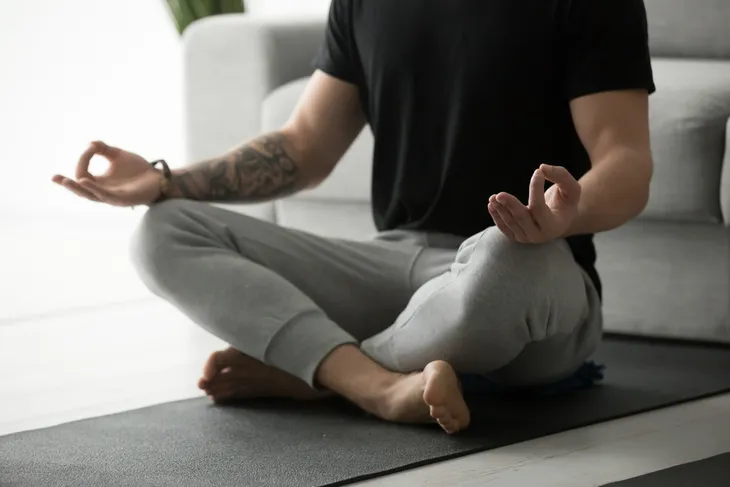Meditation has become increasingly popular over the years, providing people with a way to relax, reduce stress, and clear their minds. But while those are some of the most commonly known benefits of meditation, in recent years there has been more and more physical and emotional health benefits discovered through science.
Research studies continue to shine light on these proven benefits, and there are even more that strongly suggest additional ways meditation encourages better health in pretty much all areas of the body. Of course, like any exercise or lifestyle change that claims significant health benefits, there are some scientists who don’t believe or support the claims.
Regardless of the debate, there are at least these 10 reasons why science supports meditation…
Reduce Stress
The effect meditation has on stress is probably the most common benefit people are aware of. There are a lot of ways meditation impacts emotional and mental health because it’s a unique exercise that targets your mind, where you learn how to find calmness and relaxation in this busy world. With how hectic your life gets between working, taking care of your home, having children, and other things that fill your time, stress is bound to happen. Using meditation to reduce this stress could change your life for the better.
One of the good things about meditation is that it doesn’t take copious amounts of time to do, yet the benefits are great. Meditating for even 5 minutes can provide a significant decrease in stress, yes, when done properly, it’s that quick. This makes it easy to stick to doing meditation often if you experience stress regularly, or to add it in here and there as needed. Of course, many people find plenty of other benefits from meditating regularly even when they don’t experience a lot stress, and so you’ll find many doctors and other health professionals encouraging meditation.
Increased Happiness
Happiness affects your whole life, as well as those around you. Being happy doesn’t happen naturally for a lot of people, but there are ways to increase your happiness, one of which is meditation. Studies on the effects of meditation have shown that the control of emotions through meditation results in positive feelings. The scientific aspect of this is that the part of the brain responsible for these types of feelings (left prefrontal cortex) experiences an increase in signalling of more happy feelings. To make this even better, it can decrease the amount of negative feelings from the right side of the brain.
Meditation affects all aspects of your health, contributing to how happy you feel about pretty much everything. The other benefits of meditation can also contribute to happiness, such as relieving stress, sleeping well, and better concentration. To be truly happy or as happy as you can be, you need to manage your overall health. Since meditation targets all aspects of the body, meditating regularly while also making healthy lifestyle choices is likely to result in several positive changes, with happiness being an obvious effect.
Better Sleep
When it comes to improving sleep, some scientific research studies show a reduction in insomnia through a form of mindfulness-based stress reduction techniques, a form of meditation. Regularly sleeping well and getting enough sleep is important to both your physical and mental health. With meditation, not only could it be an effective solution to sleeping problems but it can contribute to reducing stress and concentrating better. According to the American Heart Association, meditating is also good for your cardiovascular health and can reduce the risk of cardiovascular disease.
If you’re tired and looking for a way to break restless sleeping patterns or insomnia, meditation may seem like too far of a stretch for you. For instance, lack of sleep can cause trouble concentrating, so meditation may seem like something you won’t be able to focus on. But it can clear your mind, hone your focus, relieve tension throughout the body, and reduce stress…all of which are factors that encourage good sleep patterns.
Reduce Blood Pressure
According to the Mayo Clinic, research suggests that meditation can reduce blood pressure. Some scientists do not agree that there is enough evidence yet that proves many of the physical health benefits meditation claims to provide. But over the years research has uncovered the ability of meditation to lower high blood pressure in some people, leading many scientists to argue there is enough proof to encourage the use of meditation as a means to maintain or reduce blood pressure.
Many styles of meditation focus on regulating and being aware of how you breathe. This allows you to clear your mind and let go of stress and other forms of tension in your body (like muscle tension). When you achieve this form of relaxation through meditation, the body reacts naturally and causes a drop in blood pressure through the opening up blood vessels. The blood vessels react this way from the relaxation involved in meditation. With all the different types of meditation to choose from, there’s a good chance anyone with high blood pressure who wants to lower it naturally could find one that they’re comfortable with.
Treatment for Depression
Depression can be a debilitating disease because of its ability to impact every area of your life. It can cause a lot of emotional stress and hurt your mental health to the point that everyday things seem impossible. Managing and overcoming depression is difficult, but with the right treatment people can live happy, healthy lives. Meditation is one aspect that science supports as a way to help lessen the symptoms of depression. Many of the health issues (including depression) that meditation can help with relate back to stress and once that stress is lifted, it can be easier for people with depression to cope.
It’s difficult to treat depression, so trying different and several types of treatments like meditation could bring positive results. Not only could meditation help with coping with depression and lessening its impact, some research has shown that it could be a proactive deterrent for becoming depressed again in the future. Even for scientists who don’t feel there is enough evidence to support the effect of meditation on depression, a lot of the benefits gained from meditating depend on the belief of its ability to make a difference.
Improved Brain Function
A good way to understand meditation is to think of it as a way to exercise your brain, and scientists have found that it can actually change how the brain functions. Meditation encourages mindfulness, which is essentially learning how to focus your mind, emotions and thoughts on the present. Tt’s also about becoming aware of the present in a non-judgmental way. A lot of stress comes from holding onto the past and worrying about the future, so mindfulness (or to some, it’s considered mindfulness meditation), helps address this and can improve the brain’s ability to look at things logically and rationally.
Studies that monitor the brain function of people who meditate and those who don’t have produced several results that indicate a definite difference in not just how the brain processes things, but also the actual physiological make up of the brain. The differences have shown that meditation can increase the brain’s ability to process information, as well as dealing with emotions. Learning the practices of mindfulness can have a profound impact on all aspects of your life because of its effect on your brain.
Pain Reduction
There are many skeptics out there who don’t believe in the power of meditation, especially in the context of providing physical benefits. Meditation doesn’t work for everyone and it might not provide the same benefits for one person as it does the other. But as old researched is reviewed and more research is conducted, some studies have shown that science supports meditation in providing pain relief. Zen meditation and mindfulness-based stress reduction (a result of meditation) combined with other forms of pain management could provide a well-rounded treatment plan.
No matter how small, anyone who’s experienced pain that requires over the counter pain relief or prescription medication knows how disruptive pain can be, and chronic pain is especially difficult to deal with. Then there’s the increasing amount of people who don’t want to rely on medication to combat pain due to side effects and reliance. While meditation won’t solve all your pain and isn’t the only treatment that should be considered, studies have shown it can reduce the intensity of chronic pain and even completely relieve mild pain in a natural way.
Losing and Maintaining Weight
Losing weight is a struggle for most and often frustrating at best. You’ve likely been on a diet or have pushed yourself to lose weight through exercise, and most people you know have probably done the same. When it comes to meditation and its ability to assist in weight loss efforts, science has shown that those who regularly meditate and focus on mindfulness are able to change their eating habits for the better. These studies resulted in people either losing weight because they ditched their poor eating habits or maintaining their weight.
Meditation can help with weight loss and weight management through being more aware of what you eat, what causes you to eat poorly, and preventing binge or emotional eating. You learn to understand the effect of your eating habits and what you put in your body through mindfulness. You can actually practice mindfulness meditation while you eat, affecting your eating habits in the moment. Like any strategy for losing weight, the success can depend on more than just your ability to meditate but it’s a definite strategy that many could benefit from.
Improved Immune Function
A study conducted by the National Center for Biotechnology Information (NCBI) on the effect of meditation on the body’s immune system and function showed some interesting and positive results – people in the meditation group had an increase in antibodies, your body’s natural defense mechanism that fights and prevents infections and diseases. On top of this study and others that have shown similar results, there are other factors that affect the immune system and that meditation improves, providing an extra boost to your system.
For example, stress can weaken the immune system. But meditation has been proven to greatly reduce stress and inner turmoil, so the result is a strengthening in the immune system and function. Not only does the NCBI study and other research show a connection between meditation and immune function, it’s common for people who practice meditation to say they hardly ever get sick. Although what people say isn’t considered scientific evidence, this is yet another example of the positive feelings from meditating and the way it can positively affect the whole body.
Treatment for Anxiety
There are several studies that show why science supports meditation and some of this research focuses on using meditation as treatment for anxiety disorders. It’s not surprising that results from studies have indicated the effectiveness of meditation for people who suffer from anxiety; anxiety is a mental health disorder and meditation targets stress that anxiety could stem from, ultimately having some level of positive impact when done properly. Since meditation can reduce stress, the benefits of doing so carries over to addressing feelings of anxiousness.
Not everyone with anxiety will reap significant benefits of meditation, but science has continually shown a connection to improved mental health through meditation. The mindfulness-based stress reduction from the practice affects your emotions, letting you learn how to focus on the present. Doing so can help ease anxiety, especially since anxiousness often stems from worries and stress about the past or future. When combined with a strategic treatment plan that includes several ways to address anxiety disorders, meditation can bring positive results in reducing the symptoms and severity of episodes.













